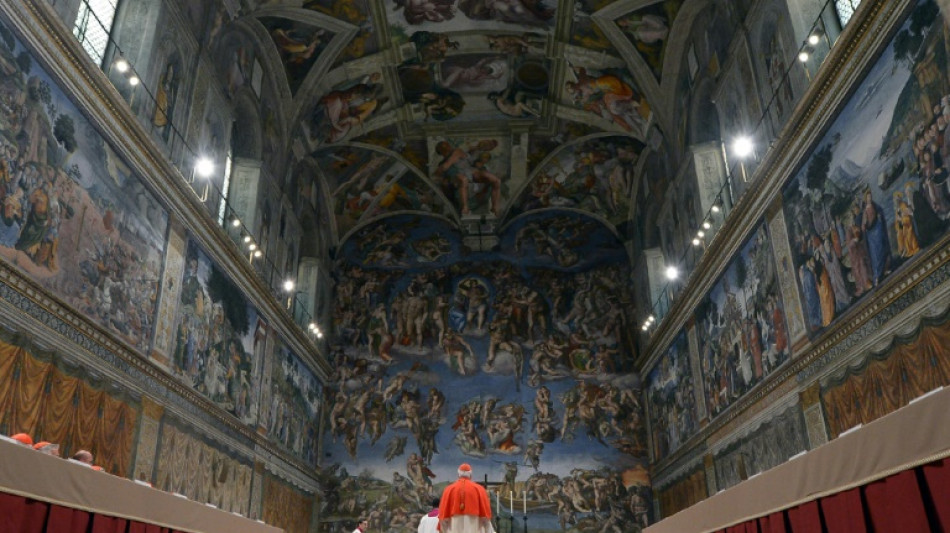
-
 Japa's Miura and Kihara capture Skate America pairs gold
Japa's Miura and Kihara capture Skate America pairs gold
-
Who can qualify for 2026 World Cup in final round of European qualifiers

-
 UK to cut protections for refugees under asylum 'overhaul'
UK to cut protections for refugees under asylum 'overhaul'
-
England's Tuchel plays down records before final World Cup qualifier

-
 Depoortere double helps France hold off spirited Fiji
Depoortere double helps France hold off spirited Fiji
-
Scotland face World Cup shootout against Denmark after Greece defeat

-
 Hansen hat-trick inspires Irish to record win over Australia
Hansen hat-trick inspires Irish to record win over Australia
-
Alcaraz secures ATP Finals showdown with 'favourite' Sinner

-
 UK to cut protections for refugees under asylum 'overhaul': govt
UK to cut protections for refugees under asylum 'overhaul': govt
-
Spain, Switzerland on World Cup brink as Belgium also made to wait

-
 Sweden's Grant leads by one at LPGA Annika tournament
Sweden's Grant leads by one at LPGA Annika tournament
-
Scotland cling to hopes of automatic World Cup qualification despite Greece defeat

-
 Alcaraz secures ATP Finals showdown with great rival Sinner
Alcaraz secures ATP Finals showdown with great rival Sinner
-
England captain Itoje savours 'special' New Zealand win

-
 Wales's Evans denies Japan historic win with last-gasp penalty
Wales's Evans denies Japan historic win with last-gasp penalty
-
Zelensky renews calls for more air defence after deadly strike on Kyiv

-
 NBA's struggling Pelicans sack coach Willie Green
NBA's struggling Pelicans sack coach Willie Green
-
Petain tribute comments raise 'revisionist' storm in France

-
 Spain on World Cup brink as Belgium also made to wait
Spain on World Cup brink as Belgium also made to wait
-
Spain virtually seal World Cup qualification in Georgia romp

-
 M23, DR Congo sign new peace roadmap in Doha
M23, DR Congo sign new peace roadmap in Doha
-
Estevao, Casemiro on target for Brazil in Senegal win

-
 Ford steers England to rare win over New Zealand
Ford steers England to rare win over New Zealand
-
Massive march in Brazil marks first big UN climate protest in years

-
 Spain rescues hundreds of exotic animals from unlicensed shelter
Spain rescues hundreds of exotic animals from unlicensed shelter
-
Huge fire sparked by explosions near Argentine capital 'contained'

-
 South Africa defy early red card to beat battling Italy
South Africa defy early red card to beat battling Italy
-
Sinner beats De Minaur to reach ATP Finals title match

-
 Zelensky vows overhaul of Ukraine's scandal-hit energy firms
Zelensky vows overhaul of Ukraine's scandal-hit energy firms
-
South Africa defy early red card to beat Italy

-
 Alex Marquez claims Valencia MotoGP sprint victory
Alex Marquez claims Valencia MotoGP sprint victory
-
McIlroy shares lead with Race to Dubai title in sight

-
 Climate protesters rally in Brazil at COP30 halfway mark
Climate protesters rally in Brazil at COP30 halfway mark
-
Spike Lee gifts pope Knicks jersey as pontiff meets film stars

-
 BBC caught in crossfire of polarised political and media landscape
BBC caught in crossfire of polarised political and media landscape
-
'Happy' Shiffrin dominates in Levi slalom for 102nd World Cup win

-
 Palestinian national team on 'mission' for peace in Spain visit
Palestinian national team on 'mission' for peace in Spain visit
-
Brazilian 'Superman' cheers child cancer patients in Ghana

-
 India close in on win over South Africa after Jadeja heroics
India close in on win over South Africa after Jadeja heroics
-
Huge explosions rock industrial area near Argentina's capital

-
 Bezzecchi takes pole for Valencia sprint and MotoGP
Bezzecchi takes pole for Valencia sprint and MotoGP
-
Dominant Shiffrin leads after first slalom run in Levi

-
 Nine killed in accidental explosion at Indian Kashmir police station
Nine killed in accidental explosion at Indian Kashmir police station
-
Climate protesters to rally at COP30's halfway mark

-
 Fighting South Africa lose Rickelton after India 189 all out
Fighting South Africa lose Rickelton after India 189 all out
-
Harmer leads South Africa fightback as India 189 all out

-
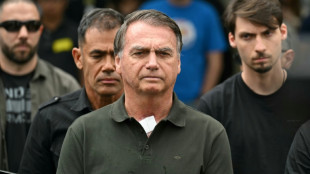 Prison looms for Brazil's Bolsonaro after court rejects his appeal
Prison looms for Brazil's Bolsonaro after court rejects his appeal
-
EU bows to pressure on loosening AI, privacy rules
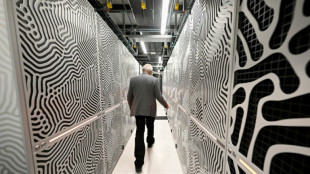
-
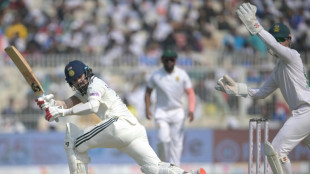 India close in on lead despite South African strikes
India close in on lead despite South African strikes
-
Curry's 49 points propel Warriors in 109-108 win over Spurs
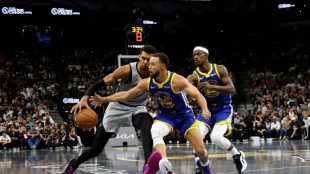

Doves, deaths and rations: Papal elections over time
Cardinals electing Pope Francis's successor will have an easier time than many of their predecessors, who endured spartan conditions and were even locked up so long that some of them died.
Here are some notable papal elections through the ages.
- The dove decides -
In 236, the Christian community of Rome was debating potential papal candidates when a white dove landed on the head of a bystander, Fabian.
"At this, everyone, as if moved by a single divine inspiration, eagerly and wholeheartedly called out that Fabian was worthy," according to Eusebius, a Church historian of the era.
The blessing was a mixed one for Fabian, who died 14 years later a martyr, persecuted by Emperor Decius.
- Large-scale bribery -
In the early Church, popes were elected by members of the clergy and the Roman nobility, and the votes were rife with meddling.
One of the most infamous elections was in 532, following the death of Boniface II, which involved "large-scale bribing of royal officials and influential senators", according to P.G. Maxwell-Stuart in "Chronicle of the Popes".
In the end, an ordinary priest was elected, Mercurius. He became the first pope to change his name -- to John.
In 1059, Nicholas II gave cardinals sole authority to choose pontiffs.
- Lock them up -
The idea of locking up the cardinals to encourage a quick decision began in the 13th century -- the word conclave comes from the Latin phrase meaning "with key".
In 1241, when the election was dragging on, the head of Rome's government locked the cardinals into a dilapidated building and refused to clean the lavatories or provide doctors for those who fell ill.
According to Frederic Baumgartner in his "Behind Locked Doors: A History of the Papal Elections", the cardinals only reached a decision after one of them died and the Romans threatened to exhume his corpse and have it make decisions.
After 70 days, they agreed on Goffredo Castiglioni, who became Celestine IV.
- Three years -
The longest conclave in history lasted almost three years following the death of Clement IV in November 1268, held in the papal palace at Viterbo, near Rome.
From late 1269 the cardinals allowed themselves to be locked in to try to reach a decision, and by June 1270, frustrated locals tore the roof off in a bid to speed things along.
They were apparently inspired by a quip by an English cardinal that without the roof, the Holy Spirit could descend unhindered.
Teobaldo Visconti became pope Gregory X in September 1271.
- Rations -
In response to the chaos the led to his election, Gregory X changed the rules, requiring cardinals to meet within 10 days of the pope's death -- and ordering that their food be reduced over time.
If there was no decision in three days, meals were to be reduced to only one of the two traditional Italian main courses.
After five days, they would be cut back to just bread, water and wine, according to John L. Allen's book "Conclave".
The cardinals were also barred from drawing on their incomes during a conclave.
- Camp beds -
Conclaves have for centuries been held in the Apostolic Palace, and since 1878 in its Sistine Chapel.
Cardinals have in the past slept in the Apostolic Palace, with cubicles erected with camp beds, and one bathroom for every 10 electors, according to Allen's "Conclave".
The windows were sealed shut but in 1978, when the conclave took place during a stifling August, there was a near revolt by cardinals who demanded they be opened.
John Paul II -- elected in a second conclave in that year, in October -- ordered the construction of the $20 million Santa Marta guesthouse in the Vatican grounds, where Francis himself lived, and where the cardinals now stay.
It has more than 100 guest suites and around two dozen single rooms. But during the conclave there, too, the windows are sealed shut.
- Non cardinals -
Technically any baptised male can become pope, but the last non-cardinal to be elected was the archbishop of Bari, Bartolomeo Prignano, who became Urban VI in 1378.
- Reluctant pontiff -
Not everyone is keen. The first words of Albino Luciani, on becoming John Paul I in 1978, were "May God forgive you for what you have done!"
He died 33 days later.
- Champagne -
In 1978, after appearing to the crowds in St Peter's Square, John Paul II reportedly walked around pouring champagne for the cardinals, and sang Polish folk songs.
In 2005, Benedict XVI invited all the cardinals to stay for dinner with champagne and there were also songs, the late cardinal Cormac Murphy-O'Connor recalled afterwards.
- Shorter and shorter -
The longest conclave in more recent times was that of 1831, which elected Gregory XVI after more than 50 days.
The longest of the 20th century, lasted only five days (14 ballots) when Pius XI was elected in 1922.
In 2005, Benedict XVI was elected in just two days (four ballots) and Francis in 2013 also in two days (five ballots).
L.AbuAli--SF-PST




